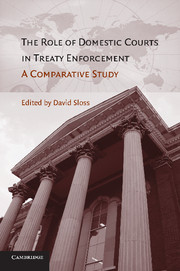Book contents
- Frontmatter
- Contents
- Contributors
- Preface
- Acknowledgments
- 1 Treaty Enforcement in Domestic Courts: A Comparative Analysis
- 2 Does International Law Obligate States to Open Their National Courts to Persons for the Invocation of Treaty Norms That Protect or Benefit Persons?
- 3 Australia
- 4 Canada
- 5 Germany
- 6 India
- 7 Israel
- 8 The Netherlands
- 9 Poland
- 10 Russian Federation
- 11 South Africa
- 12 United Kingdom
- 13 United States
- 14 The Role of Domestic Courts in Treaty Enforcement: Summary and Conclusions
- Index
- References
9 - Poland
Published online by Cambridge University Press: 06 January 2010
- Frontmatter
- Contents
- Contributors
- Preface
- Acknowledgments
- 1 Treaty Enforcement in Domestic Courts: A Comparative Analysis
- 2 Does International Law Obligate States to Open Their National Courts to Persons for the Invocation of Treaty Norms That Protect or Benefit Persons?
- 3 Australia
- 4 Canada
- 5 Germany
- 6 India
- 7 Israel
- 8 The Netherlands
- 9 Poland
- 10 Russian Federation
- 11 South Africa
- 12 United Kingdom
- 13 United States
- 14 The Role of Domestic Courts in Treaty Enforcement: Summary and Conclusions
- Index
- References
Summary
STATUS OF TREATIES IN THE DOMESTIC LEGAL SYSTEM
Introduction
Early History, 1921–1952. Until 1997, constitutional regulation of the position of international law in the Polish domestic legal order was rather scarce. The Constitution of March 17, 1921 (adopted after Poland had regained its independence in 1918) provided that international treaties are concluded (i.e., ratified) by the president of the republic. However, ratification of certain categories of treaties required a prior authorization of the parliament; in practice, this authorization was given in the form of a statute. A similar framework was adopted in the Constitution of April 23, 1935 – Article 52, Section 1, clearly established that parliamentary authorization had to be given in the form of a statute.
This system was understood – in both the legal commentary and judicial case law – as based on the concept of transformation: the presidential ratification and the official publication of a treaty in the Journal of Laws transformed its provisions into provisions of domestic law. As indicated by the Supreme Court, “a treaty, when ratified and duly published…becomes a statutory instrument and gains a binding force in the domestic legal relations.” Thus, the date of publication determined the date from which a treaty entered into the domestic legal system. Because ratification required a prior parliamentary authorization and because that authorization took the form of a statute, such treaties were considered to have a statutory rank within the domestic legal order.
- Type
- Chapter
- Information
- The Role of Domestic Courts in Treaty EnforcementA Comparative Study, pp. 370 - 409Publisher: Cambridge University PressPrint publication year: 2009

